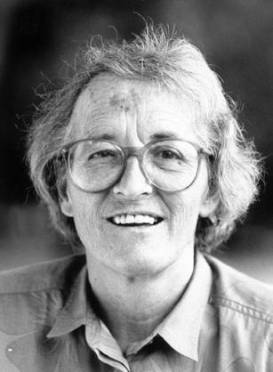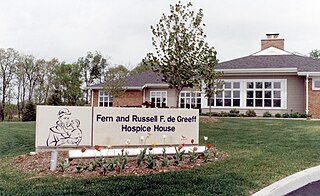Related Research Articles
Dying is the final stage of life which will eventually lead to death. Diagnosing dying is a complex process of clinical decision-making, and most practice checklists facilitating this diagnosis are based on cancer diagnoses.
Palliative care is an interdisciplinary medical caregiving approach aimed at optimizing quality of life and mitigating suffering among people with serious, complex, and often terminal illnesses. Within the published literature, many definitions of palliative care exist. The World Health Organization (WHO) describes palliative care as "an approach that improves the quality of life of patients and their families facing the problems associated with life-threatening illness, through the prevention and relief of suffering by means of early identification and impeccable assessment and treatment of pain, illnesses including other problems whether physical, psychosocial, and spiritual". In the past, palliative care was a disease specific approach, but today the WHO takes a broader patient-centered approach that suggests that the principles of palliative care should be applied as early as possible to any chronic and ultimately fatal illness. This shift was important because if a disease-oriented approach is followed, the needs and preferences of the patient are not fully met and aspects of care, such as pain, quality of life, and social support, as well as spiritual and emotional needs, fail to be addressed. Rather, a patient-centered model prioritizes relief of suffering and tailors care to increase the quality of life for terminally ill patients.

Thanatology is the scientific study of death and the losses brought about as a result. It investigates the mechanisms and forensic aspects of death, such as bodily changes that accompany death and the postmortem period, as well as wider psychological and social aspects related to death. It is primarily an interdisciplinary study offered as a course of study at numerous colleges and universities.
Terminal illness or end-stage disease is a disease that cannot be cured or adequately treated and is expected to result in the death of the patient. This term is more commonly used for progressive diseases such as cancer, dementia or advanced heart disease than for injury. In popular use, it indicates a disease that will progress until death with near absolute certainty, regardless of treatment. A patient who has such an illness may be referred to as a terminal patient, terminally ill or simply as being terminal. There is no standardized life expectancy for a patient to be considered terminal, although it is generally months or less. Life expectancy for terminal patients is a rough estimate given by the physician based on previous data and does not always reflect true longevity. An illness which is lifelong but not fatal is a chronic condition.

Elisabeth Kübler-Ross was a Swiss-American psychiatrist, a pioneer in near-death studies, and author of the internationally best-selling book, On Death and Dying (1969), where she first discussed her theory of the five stages of grief, also known as the "Kübler-Ross model".

Dame Cicely Mary Strode Saunders was an English nurse, social worker, physician and writer. She is noted for her work in terminal care research and her role in the birth of the hospice movement, emphasising the importance of palliative care in modern medicine, and opposing the legalisation of voluntary euthanasia.

Marie Curie is a registered charitable organisation in the United Kingdom which provides hospice care and support for anyone with an illness they’re likely to die from, and those close to them, and campaigns for better support for dying people. It was established in 1948, the same year as the National Health Service (NHS).

The Cardiff University School of Medicine is the medical school of Cardiff University and is located in Cardiff, Wales, UK. Founded in 1893 as part of the University College of South Wales and Monmouthshire, it is the oldest of the three medical schools in Wales.

A therapy or medical treatment is the attempted remediation of a health problem, usually following a medical diagnosis. Both words, treatment and therapy, are often abbreviated tx, Tx, or Tx.
The Liverpool Care Pathway for the Dying Patient (LCP) was a care pathway in the United Kingdom covering palliative care options for patients in the final days or hours of life. It was developed to help doctors and nurses provide quality end-of-life care, to transfer quality end-of-life care from the hospice to hospital setting. The LCP is no longer in routine use after public concerns regarding its nature. Alternative methodologies for Advance care planning are now in place to ensure patients are able to have dignity in their final hours of life. Hospitals were also provided cash incentives to achieve targets for the number of patients placed on the LCP.

In 2007, neurologist Oliver Sacks released his book Musicophilia: Tales of Music and the Brain in which he explores a range of psychological and physiological ailments and their intriguing connections to music. It is broken down into four parts, each with a distinctive theme; part one titled Haunted by Music examines mysterious onsets of musicality and musicophilia. Part two A Range of Musicality looks at musical oddities musical synesthesia. Parts three and four are titled Memory, Movement, and Music and Emotions, Identity, and Music respectively. Each part has between six and eight chapters, each of which is in turn dedicated to a particular case study that fit the overarching theme of the section. Presenting the book in this fashion makes the reading a little disjointed if one is doing so cover to cover, however, it also means one may pick up the book and flip to any chapter for a quick read without losing any context. Four case studies from the book are featured in the NOVA program Musical Minds aired on June 30, 2009.

Hospice care is a type of health care that focuses on the palliation of a terminally ill patient's pain and symptoms and attending to their emotional and spiritual needs at the end of life. Hospice care prioritizes comfort and quality of life by reducing pain and suffering. Hospice care provides an alternative to therapies focused on life-prolonging measures that may be arduous, likely to cause more symptoms, or are not aligned with a person's goals.

Cancer treatments are a wide range of treatments available for the many different types of cancer, with each cancer type needing its own specific treatment. Treatments can include surgery, chemotherapy, radiation therapy, hormonal therapy, targeted therapy including small-molecule drugs or monoclonal antibodies, and PARP inhibitors such as olaparib. Other therapies include hyperthermia, immunotherapy, photodynamic therapy, and stem-cell therapy. Most commonly cancer treatment involves a series of separate therapies such as chemotherapy before surgery. Angiogenesis inhibitors are sometimes used to enhance the effects of immunotherapies.
An informal or primary caregiver is an individual in a cancer patient's life that provides unpaid assistance and cancer-related care. Caregiving is defined as the processing of assiting someone who can't care for themselves, which includes physical, mental, emotional, social, and spiritual needs. Due to the typically late onset of cancer, caregivers are often the spouses and/or children of patients, but may also be parents, other family members, or close friends. Taking care of family members at home is a complicated experience. The relationships involved constantly shift and change, in expected and unexpected ways. The expected or expected changes can negatively affect physical health, emotions, social life, and spiritual well-being of the caregiver. Informal caregivers are a major form of support for the cancer patient because they provide most care outside of the hospital environment. This support includes:

Assisi Hospice is a hospice facility in Singapore that provides palliative care to terminally ill patients. It is founded, owned, and run by the Franciscan Missionaries of the Divine Motherhood.

On 10 January 2016, the English musician David Bowie died at his Lafayette Street home in New York City, having been diagnosed with liver cancer 18 months earlier. He died two days after the release of his twenty-sixth and final studio album, Blackstar, which coincided with his 69th birthday.

Morfydd Clark is a Swedish-born Welsh actress. She is best known for playing Galadriel in the Amazon Prime series The Lord of the Rings: The Rings of Power (2022–). She received a number of accolades for her performance in the film Saint Maud (2019), including a BAFTA Cymru as well as BIFA and BAFTA Rising Star Award nominations.
Healthcare chaplaincy is the provision of pastoral care, spiritual care, or chaplaincy services in healthcare settings, such as hospitals, hospices, or home cares.

Abhishek Shukla is an Indian geriatrician and palliative care physician. He is the expert on Hospice and palliative medicine.

Professor Mark Taubert FRCP FRCGP FLSW is a German-British consultant doctor and professor of medicine at Cardiff University. He is a palliative care physician in Wales, who according to the Western Mail and Welsh Government website has contributed significantly to the development of his specialty, and has received recognition as a doctor and campaigner, nationally and internationally.
References
- 1 2 Thompson, Jessie (6 August 2019). "The Colours review: Verbatim show offers a gentle insight into a difficult subject". Evening Standard. Retrieved 20 February 2024.
- ↑ "Crowded Room Theatre Company announces world premiere of The Colours at Soho Theatre". Theatre News. 25 June 2019. Retrieved 20 February 2024.
- ↑ Newland, Eleanor (2 August 2019). "Mortality isn't extraordinary: the play you need to see that aims to dispel our fears about dying". Marie Curie News. Retrieved 20 February 2024.
- ↑ "New play based on hospice patient interviews opens". eHospice News. 30 July 2019. Retrieved 20 February 2024.
- ↑ "New play uses words of people reaching the end of life". Swansea Bay University Health Board News. 18 Aug 2019. Retrieved 20 February 2024.
- ↑ Wicker, Tom (5 August 2019). "'The Colours' review". Time Out. Retrieved 20 February 2024.
- ↑ "Good Grief Festival 2023: Grief, Metaphor and Storytelling: The Colours & The Colours of Loss". Good Grief Festival. 25 April 2023. Retrieved 20 February 2024.